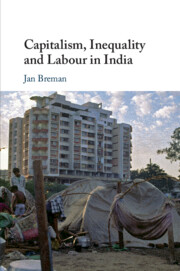Book contents
- Capitalism, Inequality and Labour in India
- Capitalism, Inequality and Labour in India
- Copyright page
- Contents
- Figures
- Preface
- Acknowledgements
- Part I Labour as Codified in the Annals of the State
- Part II Destitute in Bondage
- Part III The Political Economy of Boundless Dispossession
- 6 The Agrarian Question Posed as the Social Question
- 7 Labour Migration: Going Off and Coming Back
- 8 Indebtedness as Labour Attachment
- Part IV Conclusion
- References
- Index
6 - The Agrarian Question Posed as the Social Question
from Part III - The Political Economy of Boundless Dispossession
Published online by Cambridge University Press: 29 July 2019
- Capitalism, Inequality and Labour in India
- Capitalism, Inequality and Labour in India
- Copyright page
- Contents
- Figures
- Preface
- Acknowledgements
- Part I Labour as Codified in the Annals of the State
- Part II Destitute in Bondage
- Part III The Political Economy of Boundless Dispossession
- 6 The Agrarian Question Posed as the Social Question
- 7 Labour Migration: Going Off and Coming Back
- 8 Indebtedness as Labour Attachment
- Part IV Conclusion
- References
- Index
Summary
In my account of the system of labour bondage as it operated in south Gujarat in the past and present, I reported in the early 1970s that halipratha, which had already shown signs of disintegration in the preceding decades, was now on the verge of collapse. My sustained interest in the changing configuration of the political economy and how it played out at the local level focused on queries that immediately came up in the light of this conclusion. In the first place, how to explain the erosion of the master-servant relationship in agriculture? The second question focused on the pattern of employment that replaced labour attachment in the prime sector of the economy, and the third one meant to deal with the changed fabric of interaction between the main landowners and the landless workforce. I set out to answer these questions through new spells of fieldwork in the same region, the central plain of south Gujarat. These rural investigations were carried out between the early 1970s and the early 1990s in two villages that had been my previous fieldwork sites in what was now demarcated as Valsad district and, in order to widen the scope of my enquiries, in one more village near Bardoli situated in the restructured territory of Surat district. This chapter discusses my findings over the reported periods.1
- Type
- Chapter
- Information
- Publisher: Cambridge University PressPrint publication year: 2019



